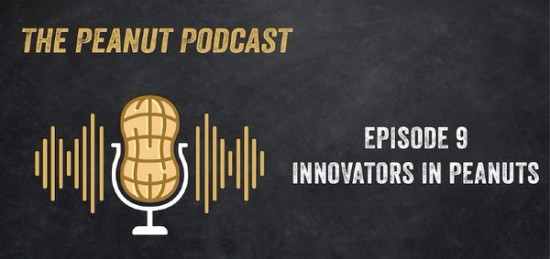In the peanut industry, there are always advancements in the works. You will find talented and dedicated people creating single origin peanut products, organic peanut farming or even mapping the genome of this legume. Innovators are on the forefront of pushing peanuts to new limits. The National Peanut Board (NPB) covered the topic in a recent episode of The Peanut Podcast. Read below for highlights and listen to the episode here or on your favorite streaming platform.
Marshall Rabil is the director of sales and marketing for his family’s peanut business, Hubs. His grandparents started this gourmet peanut business in 1954 in Sedley, Virginia where it still operates today. Rabil utilized their new facility’s extra space and turned it into a gathering spot called Hubs the Vine, where local musicians can play on the weekends and food banks can assemble donated goods for the community.
His latest innovation for Hubs is selling and creating single-origin peanut products. Elisha Barnes, narrator of the Virginia Peanut Story, approached Rabil to sell the single-origin red skinned peanuts he grew, which sold out on the Hubs website within 24 hours. This led Rabil to find a new peanut product category and he eventually partnered with KYYA Chocolate in Arkansas to create the first ever single origin chocolate peanut bar.
“And in the future, I would love to continue to work with other companies and collaborate on small batch limited release products,” said Rabil.
In South Georgia resides first-generation farmer, Sedrick Rowe, who is one of the few Georgia famers to grow organic peanuts. Rowe discovered his passion for agriculture in college where he could utilize his football skills with organic farming, which can be more physically demanding.
“Yeah, this organic is not for everyone, because it's very intense labor. You know, it just requires a lot. I just feel like that was my you know, niche or calling,” said Rowe. “And so that was that is what led me to get more into the organic side.”
Rowe envisions a research facility one day dedicated to new crops in Georgia, but more specifically the history and evolution of peanuts and peanut farming.
“I want, you know, every part of that growing process to be studied to see how we can better handle that crop,” said Rowe.
Like Rowe, Peggy Ozias-Akins is also interested in the research aspect of peanuts. Ozias-Akins has been a professor in the University of Georgia department of horticulture for 36 years and is also the director of the institute of plant breeding, genetics and genomics within her department.
She served as executive committee co-chair of the Peanut Genome Sequencing Consortium, which is a coalition of international scientists and stakeholders that guide and implement research conducted in the Peanut Genome Project. The peanut genome project was integral in mapping the peanut genome, which helps researchers develop disease resistant peanuts among other things.
“We've been working towards the benefit of growers for many years with the molecular information that we had at hand, even 15 years ago,” said Ozias-Akins. “But now that's just greatly accelerated, and we're able to do so much more and actually apply that knowledge in ways that can more directly benefit the grower.”
Scientific research conducted on peanuts benefits growers and consumers. One peanut company launched a snack product line specifically designed to aid parents in the early introduction of peanut foods. JJ and Catherine Jaxon created Mission MightyMe when looking for a product they could buy to introduce peanuts to prevent a peanut allergy in their infant son and struggled to find what fit their needs.
The Jaxon’s approached Dr. Gideon Lack, who led the now famous LEAP study in 2015, to be a co-founder. The LEAP study found that introducing peanut foods to infants as early as 4 to 6 months could prevent the development of peanut allergy by up to 86%, which led the federal government to update their guidance about introducing peanut foods soon after.
“We have a plan for other product forms and including additional allergens. We're trying to go about this very prudently and make sure that we're doing everything right, said Jaxon. “But also be able to get great products to market as soon as we responsibly can.”
Lexi Floyd and her husband Jared find ways to innovate their growing and processing capabilities on their peanut farm in Southwest Texas. They have plans to diversify where they farm, how efficiently they can use their resources, how to create different revenue streams, and the best ways to retain their good employees.
“Jared focuses on different things to be innovative about, and I focus on different things. And I think that has really helped us in the last couple of years, especially when it's been so hard with commodity prices and inputs,” said Floyd. “I think that the fact that we're focusing on different facets, and we kind of meet in the middle has really helped us a lot.”
One of the issues the Floyds and other farmers face is availability of water and pricing it as a commodity. They’ve tried to mitigate these issues and have won the Farm Press Peanut Efficiency Awards for the Southwest in 2019.
Learn more about the latest innovations of all things peanuts related by listening to the full episode of The Peanut Podcast.
